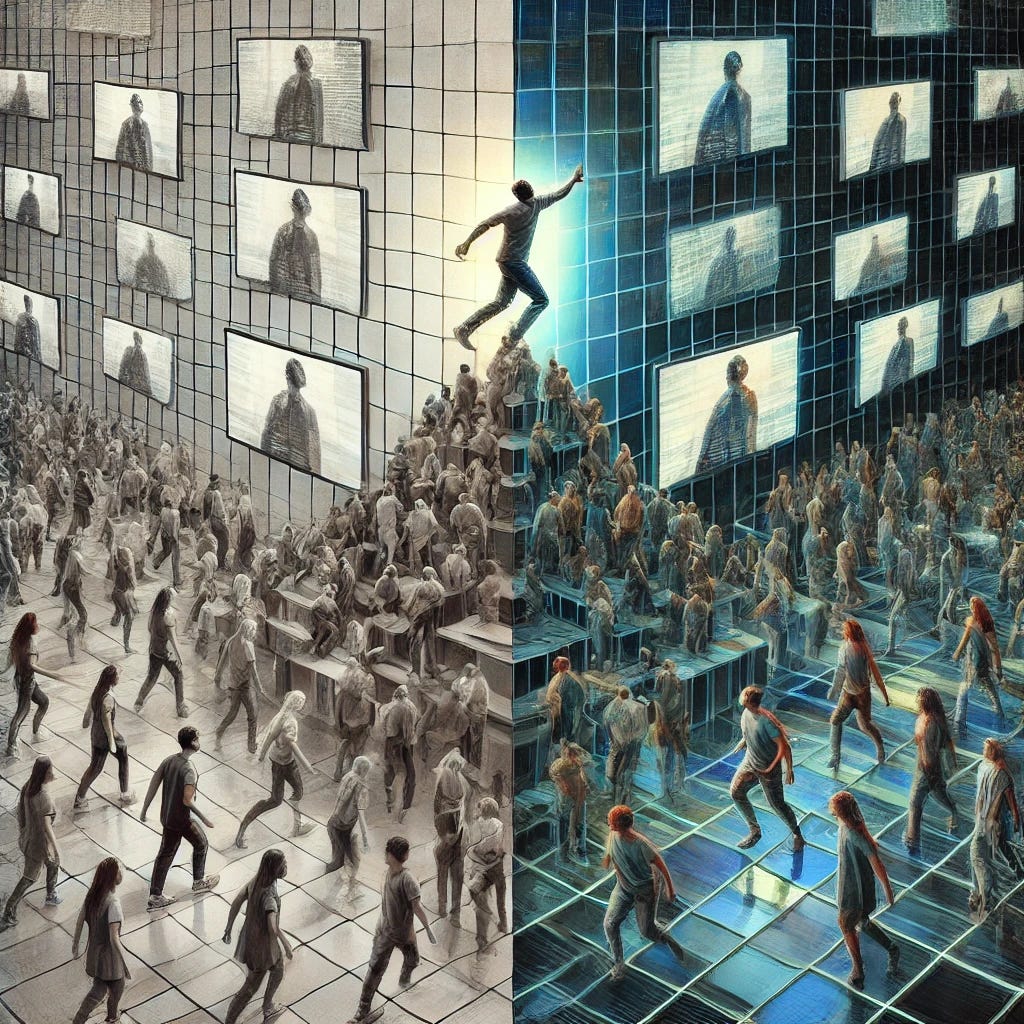In the ever-evolving landscape of digital culture, a powerful yet often overlooked force is shaping our online behaviors, desires, and consumption patterns.
This force, which we can call Digital Mimetic Consumerism (DMC, coined by John V. Teixido -
), is fundamentally changing how we interact with content, products, and each other in the digital realm.The Roots of Desire
At the heart of DMC lies the concept of mimetic desire, a theory popularized by French philosopher René Girard. According to Girard, our desires are not inherently our own but are imitative in nature. We want things because others want them, creating a complex web of social influence that drives our choices and actions. In the digital age, this mimetic desire has been amplified to unprecedented levels. Social media platforms, influencer marketing, and algorithmic recommendations have created an environment where our desires are constantly being shaped and reshaped by the perceived desires of others.
The Digital Amplification
The digital landscape serves as a perfect breeding ground for mimetic desire. Platforms like Instagram and TikTok have become hotbeds for what marketers call "social proof" – the idea that we look to others to determine what is desirable or valuable. This phenomenon is not just limited to consumer products; it extends to lifestyles, opinions, and even personal identities. Consider the rise of fitness influencers on Instagram. Their carefully curated posts not only sell products but also propagate specific body ideals and lifestyle choices. Users engage with this content through standardized expressions of sentiment and imitative behaviors, creating what researchers call "memetic logics of participation".
The Consumerist Feedback Loop
DMC creates a powerful feedback loop between content creation and consumption. As users imitate successful digital behaviors, they drive trends in content creation. This, in turn, fuels more consumption, creating a self-perpetuating cycle of digital consumerism. This cycle is further intensified by platform algorithms that prioritize engaging content, often leading to the amplification of certain trends and behaviors. The result is a digital ecosystem where desires are constantly being manufactured and reinforced.
The Erosion of Authenticity
One of the most significant impacts of DMC is the gradual erosion of authenticity in digital spaces. As users craft online personas that align with perceived ideals, the line between genuine self-expression and mimetic behavior becomes increasingly blurred. This phenomenon raises important questions about the nature of identity in the digital age. Are our online selves authentic representations of who we are, or are they carefully constructed products designed to garner likes, shares, and followers?
The Economic Implications
The impact of DMC extends far beyond individual behavior. It has profound implications for businesses and the broader economy. Companies that understand and leverage mimetic desire in their marketing strategies can gain a significant competitive advantage. For instance, the success of platforms like Shopify can be partly attributed to their ability to tap into the power of mimetic desire through influencer marketing and social commerce. By showcasing products in the context of desirable lifestyles or social groups, these platforms create powerful incentives for consumers to purchase.
The Psychological Toll
While DMC can drive engagement and consumption, it also comes with significant psychological costs. The constant pressure to keep up with digital trends and the fear of missing out (FOMO) can lead to anxiety, depression, and a sense of inadequacy. Moreover, the disposable nature of digital trends can lead to what some researchers describe as "liquid relationships," where human connections become as fleeting and unstable as the latest viral sensation.
Looking to the Future
As we move into an era of augmented reality, virtual reality, and artificial intelligence, the dynamics of DMC are likely to become even more complex. These technologies have the potential to create even more immersive and persuasive digital environments, potentially amplifying the effects of mimetic desire.
However, there's also hope for a more conscious and critical engagement with digital culture. As awareness of DMC grows, we may see a push for enhanced digital literacy and a reevaluation of what constitutes authentic self-expression in the digital age.
In conclusion, Digital Mimetic Consumerism is a powerful force shaping our online lives, influencing everything from our purchasing decisions to our sense of self. By understanding its mechanisms, we can begin to navigate the digital landscape more consciously, making choices that align with our true values rather than simply imitating the desires of others.
As we continue to grapple with the implications of DMC, one thing is clear: our relationship with digital technology and consumer culture is far more complex and intertwined than we might have imagined.
The challenge for the future will be to harness the connective power of digital platforms while maintaining our individual authenticity and agency in an increasingly mimetic world.
A Reading List 📖
"Ten Arguments for Deleting Your Social Media Accounts Right Now" by Jaron Lanier
"Digital Minimalism" by Cal Newport
"Influence: The Psychology of Persuasion" by Robert Cialdini
"Simulacra and Simulation" by Jean Baudrillard
"The Society of the Spectacle" by Guy Debord



